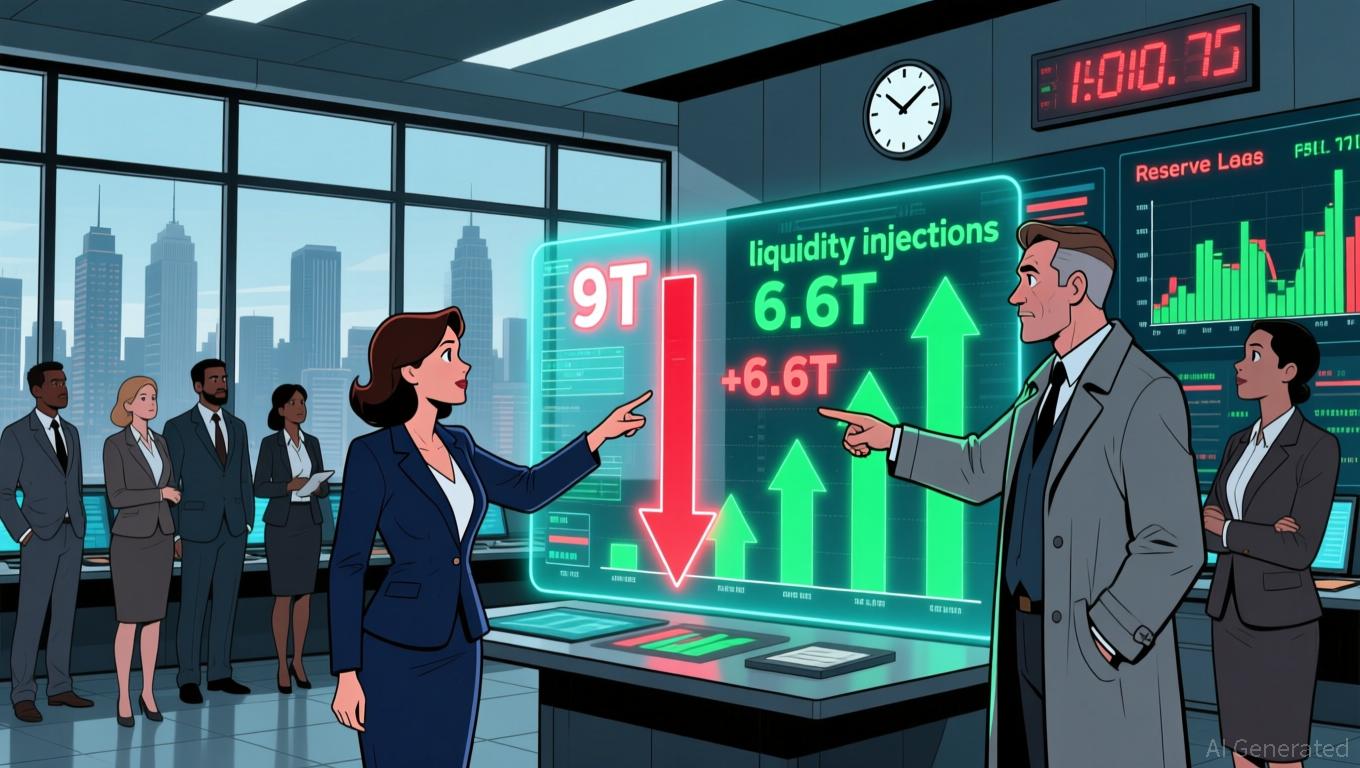TGA and Federal Reserve Actions Set Crypto Bulls and Bears on Collision Course Ahead of 2025
- U.S. Treasury's TGA refill to $800B tightens liquidity for Bitcoin and risk assets, causing sideways price movement despite rising global M2 supply. - Analysts split: Raoul Pal forecasts $200K BTC/2025 if M2 correlation resumes, while Tomas warns TGA-driven liquidity drain could create bearish conditions. - Fed's 2025 rate cuts and TGA normalization may reignite crypto bull runs, but stagflation risks and $7.5T in money market funds add uncertainty. - Altcoins like Solana and Ethereum face mixed outlooks

The U.S. Treasury General Account (TGA) has become a significant influence on Bitcoin’s recent price behavior, with experts discussing its potential effects on the wider crypto market heading into 2025. As the Treasury replenishes the TGA to nearly $800 billion—a level not seen in years—macroeconomic analysts note that liquidity for risk assets like Bitcoin has become more restricted. The TGA, which acts as the government’s main account at the Federal Reserve, has absorbed $500 billion in liquidity since July 2025 through bond sales, pulling capital out of markets and reducing funds available for speculative investments title1 [ 1 ]. This reduction in liquidity has played a role in Bitcoin’s stagnant price action, even as global M2 money supply—historically linked to crypto price movements—continues to grow title10 [ 6 ].
Raoul Pal, who leads Global Macro Investor, believes the liquidity crunch caused by the TGA is only temporary. He maintains that Bitcoin’s long-term path still tracks global M2 expansion, which has kept rising despite the recent disconnect. Pal projects that if the relationship with M2 resumes, Bitcoin could reach $200,000 by the end of 2025.
The Federal Reserve’s policy direction adds further unpredictability. The Fed’s rate cut in September 2025—the first since 2024—has been identified as a possible trigger for renewed liquidity, with 91.9% of traders expecting a 50-basis-point cut at the October FOMC meeting title2 [ 2 ]. Arthur Hayes from BitMEX suggests that a stable TGA and a looser monetary stance could restart Bitcoin’s upward momentum, allowing the cryptocurrency to benefit from cheaper borrowing and increased risk-taking title2 [ 2 ]. On the other hand, Tomas warns that uncertainty within the Fed about future rate decisions and the threat of stagflation could undermine this positive outlook title3 [ 3 ].
Looking beyond Bitcoin, alternative coins such as
Traders are paying close attention to how TGA developments, Fed actions, and global liquidity interact. The TGA’s replenishment is projected to finish by late 2025, which could allow liquidity to return and support a renewed Bitcoin rally. Nevertheless, there are risks ahead. Money market funds have reached a record $7.5 trillion, with much of this capital sitting in safe assets. If investors shift toward higher-risk options, crypto prices could rise further, but this will depend on overall economic stability title2 [ 2 ]. Jamie Coutts from Real Vision forecasts that Bitcoin could exceed $132,000 by year-end if current money supply trends hold title2 [ 2 ], though others caution that unexpected geopolitical or economic events could cause volatility.
The discussion about Bitcoin’s connection to global M2 has grown more intense, with critics like TXMC questioning the reliability of the metric. He claims that inconsistencies in how countries update M2 data make the correlation between Bitcoin and M2 questionable. Despite these concerns, supporters argue that liquidity cycles remain the main force behind Bitcoin’s long-term price movements, and Pal’s model indicates the bull market could last into 2026. This extended forecast depends on continued monetary easing and a gradual, rather than rapid, market peak.
As the TGA refill process winds down and the Fed adjusts its policies, the crypto market is approaching a crucial turning point. The balance between liquidity, monetary policy, and investor risk appetite will likely determine whether Bitcoin and altcoins can take advantage of the next upward move. Investors are encouraged to keep an eye on TGA levels, Fed interest rate decisions, and global money supply patterns, while being mindful of excessive leverage and market swings title3 [ 3 ].
Disclaimer: The content of this article solely reflects the author's opinion and does not represent the platform in any capacity. This article is not intended to serve as a reference for making investment decisions.
You may also like
Bitcoin Updates: Bitcoin Rebounds Following Shutdown Deal, Looks Toward Major Regulatory Progress
- Bitcoin stabilized above $105,000 as U.S. lawmakers neared ending the 40-day government shutdown, potentially boosting market liquidity and crypto demand. - Analysts highlight a "dual catalyst" of shutdown resolution and expected lower CPI data, predicting Bitcoin could rise to $112,000 amid improved macroeconomic optimism. - Trump's $2,000 tariff dividend proposal and CFTC's planned approval of leveraged crypto trading next month further support risk appetite and institutional interest. - Regulatory del
Bitcoin Updates: The 2025 Crypto Split—Blue-Chip Reliability Versus BZIL’s Rapid Growth Prospects
- BullZilla ($BZIL) leads 2025 crypto presales with a 3,941.56% ROI projection, priced at $0.00023239 during its 9th stage. - BNB and TRON (TRX) maintain steady gains at $952.79 and $0.286888, offering conservative alternatives to BZIL's speculative growth. - Market optimism, fueled by Trump's economic remarks and Bitcoin's rally, drives attention to BZIL's deflationary tokenomics and 24-stage burn mechanism. - Critics warn of presale volatility, but BZIL's liquidity locks and staking rewards aim to mitiga

DASH Price Drops 7.21% Following Shareholder Sale Disclosures
- DASH fell 7.21% in 24 hours amid a 27.4% 7-day drop, despite a 99.6% annual gain. - A shareholder trust filed to sell 4,575 DASH shares via a 10b5-1 plan, signaling potential ownership shifts. - DoorDash faces intensified grocery delivery competition from Instacart, Walmart , and Venmo's new rewards program. - Technical analysis shows weak mean-reversion potential post-sell-offs, with high outcome dispersion requiring strict risk management.
Fed Faces a Pivotal Choice: Managing Liquidity or Controlling Inflation
- Fed may expand balance sheet to address liquidity needs amid shrinking reserves, signaling potential end to 3-year QT program. - Officials pause QT as $6.6T reserves deemed "somewhat above ample," but warn of risks from inflation above 2% target and market volatility. - Governor Mester cautions against aggressive rate cuts, citing economic rebound risks and fiscal/regulatory factors boosting 2026 growth outlook. - External pressures including government shutdown delays and stablecoin demand growth compli
